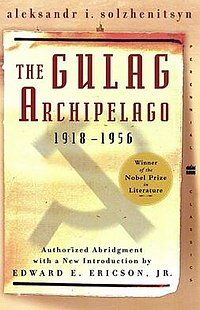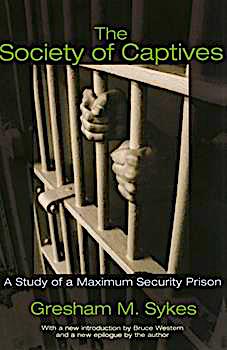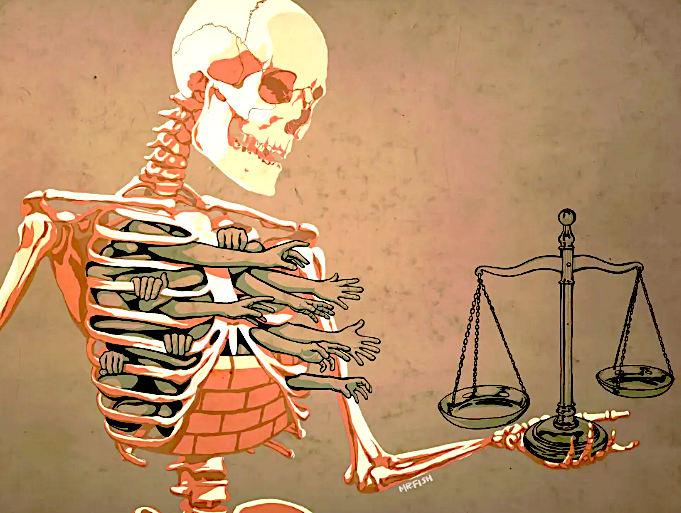There are many disturbing similarities between the brutality imposed on Stalin’s victims and the injustices endured by the incarcerated in U.S. federal and state prisons.
By Chris Hedges
ScheerPost.com
 Two nights a week for the last four months, I plowed my way through the three volumes of Aleksandr Solzhenitsyn’s The Gulag Archipelago with 17 students in the college degree program offered by Rutgers University in the New Jersey prison system.
Two nights a week for the last four months, I plowed my way through the three volumes of Aleksandr Solzhenitsyn’s The Gulag Archipelago with 17 students in the college degree program offered by Rutgers University in the New Jersey prison system.
No one in my class endures the extremities imposed on the millions who worked as slave labor, and often died, in the Soviet gulag, or work camps, set up after the Russian revolution.
The last remnants of the hundreds of camps were disbanded in 1987 by Mikhail Gorbachev, himself the grandson of gulag prisoners. Nor do they experience the treatment of those held in Abu Ghraib, Guantanamo and U.S. secret black sites who undergo mock trials and executions, torture, extreme sensory deprivation and abuse that comes disturbingly close to replicating the hell of the gulag.
Nevertheless, what Solzhenitsyn underwent during his eight years as a prisoner in the labor camps was familiar to my students, most of whom are people of color, poor, often lacking competent legal representation and almost always coerced into signing confessions or accepting plea deals that include crimes, or versions of crimes they were involved with, which were often false.
Over 95 percent of prisoners are pressured to plead out in the U.S. court system, which is not capable of providing jury trials for every defendant entitled to one, were they to actually demand one. In 2012, the Supreme Court said that
“plea bargaining . . . is not some adjunct to the criminal justice system; it is the criminal justice system.”
My students, like Soviet prisoners, or zeks, live in a totalitarian system. They too work as bonded laborers, putting in 40-hour work weeks at prison jobs and being paid $28 a month, money used to buy overpriced basic necessities in the commissary, as was true in the gulag. They too are identified by their assigned numbers, wear prison uniforms and have surrendered the rights that come with citizenship.
They are deprived of nearly all personal possessions; stripped of all the outward markers of biography and individuality; forced to endure humiliation, including stripping naked before the guards; cannot express anger at their captors without severe retribution; endure military-style regimentation; cope with constant surveillance, including, as in the gulag, a network of prison informers; can be sent to prolonged isolation; are cut off from their families, as well as the company of women; and given lengthy sentences that, short of a miracle, will mean many will die in prison.
They, too, have been demonized by the wider society, forced, as were those released into exile from the gulag, into a criminal caste system that punishes them for the remainder of their lives.
‘Society of Captives’
They live in what the sociologist Gresham Sykes called A Society of Captives, with its peculiar customs, slang, rituals and codes of behavior, all of which were replicated in the gulag as they have been in prisons throughout the centuries.

Aleksandr Solzhenitsyn on a train, in Vladivostok, during summer of 1994, for a journey across Russia after nearly 20 years in exile. (I, Evstafiev, CC BY-SA 3.0, Wikimedia Commons)
U.S. prisons, which hold around 20 percent of the world’s prison population, although the country has less than 5 percent of the global population, are forms of social control, along with militarized police, propaganda campaigns that seek to make us fearful and therefore passive, wholesale surveillance of every citizen, and a court system that has stripped legal protection from the poor — in effect, criminalizing poverty.
The deindustrialization of the U.S. and impoverishment of the working class, especially people of color, has effectively severed many from society, turning them into outcasts who live in internal colonies under the boot of paramilitary armies of occupation.
The U.S. legal system, as under the Soviet Union’s Joseph Stalin, shares a fondness for quotas, laying out in advance the number of arrests it needs, often for such non-crimes as selling loose cigarettes or having broken tail lights.
Many police departments, prosecutor’s offices and even counties in the U.S. depend on revenue generated by imprisonment, tickets, fines and civil asset forfeiture — a form of legalized theft whereby the state can seize assets, including cash, cars and homes, alleged to be connected to unlawful activity, generally without requiring a conviction or even a criminal charge.
A 2019 report by Governing, a research and analysis journal that focuses on local and state policies, found that nearly 600 small towns and cities across the U.S. obtain over 10 percent of their overall budget from such means. This increased to 20 percent of the budget for at least 284 towns and cities and to over 50 percent for 80 of them.
“Look for the brave in prison,” Solzhenitsyn wrote in The Gulag Archipelago echoing an old proverb, “and the stupid among the political leaders!”
The power of his book, arguably one of the greatest works of nonfiction from the 20th century, is that it is as much a meditation on power, resistance and living a moral life, as it is a chronicle of the gulag.
Intoxication of Power
Solzhenitsyn, a university graduate and a captain in The Red Army when he was arrested, wore his old officer’s coat to remind the guards and his fellow zeks of his former status. He had to learn to shake off the arrogance and hubris that came with his elevated position in society. Pride, he wrote, “grows in the human heart like lard on a pig.” The intoxication of power is a strong inducement to commit evil. Few are exempt.
“If my life had turned out differently, might I myself have become just such an executioner?” he wrote, suggesting that everyone should ask themselves that question.
 “If only it were all so simple!” he lamented. “If only there were evil people somewhere insidiously committing evil deeds, and it were necessary to separate them from the rest of us and destroy them. But the line dividing good and evil cuts through the heart of every human being. And who is willing to destroy a piece of his own heart?”
“If only it were all so simple!” he lamented. “If only there were evil people somewhere insidiously committing evil deeds, and it were necessary to separate them from the rest of us and destroy them. But the line dividing good and evil cuts through the heart of every human being. And who is willing to destroy a piece of his own heart?”
The initiation into this society of captives begins with arrest, a “shattering thrust, expulsion, somersault from one state into another.” It tosses the victims into what he calls a subterranean “sewage disposal system.”
“Each of us is a center of the Universe, and that Universe is shattered when they hiss at you, ‘You are under arrest,’” he wrote.
But that is only the start. The interrogation is next, designed to coerce a confession. The tactics differ little across cultures or periods of history. Sleeplessness. Physical intimidation. Lies. Threats. Prolonged isolation. The “conveyor” — continual interrogation for hours and days on end.
My students knew from experience what Solzhenitsyn found out for himself, that “it is much smarter to play the role of someone so improbably imbecile that he can’t remember one single day of his life even at the risk of being beaten.”
What, he asked, “do you need to make you stronger than the interrogator and the whole trap?”
He wrote:
“From the moment you go to prison, you must put your cozy past firmly behind you. At the very threshold, you must say to yourself: ‘My life is over, a little early to be sure, but there’s nothing to be done about it. I shall never return to freedom. I am condemned to die — now or a little later. But later on, in truth, it will be harder, and so the sooner the better. I no longer have any property whatsoever. For me those I love have died, and for them I have died. From today on, my body is useless and alien to me. Only my spirit and my conscience remain precious and important to me.”
Confronted by such a prisoner, the interrogator will tremble.
Only the man who has renounced everything can win that victory.
Solzhenitsyn argued that hope not grounded in reality is one of the greatest pacifiers in tyrannical societies: the belief that justice will ultimately prevail, that amnesty is on the horizon, that a life sentence will be commuted, that new evidence will surface which will result in a fair trial and freedom. This false hope, which Solzhenitsyn says is akin to religious belief among prisoners, is debilitating.
“Does hope lend strength or does it weaken a man?” Solzhenitsyn asked. “If the condemned man in every cell had ganged up on the executioners as they came in and choked them, wouldn’t this have ended the executions sooner than appeals to the All-Russian Central Executive Committee? When one is already on the edge of the grave, why not resist?”
He went on:
“After all, we have gotten used to regarding as valor only valor in war (or the kind that’s needed for flying in outer space), the kind which jingle-jangles with medals. We have forgotten another concept of valor — civil valor. And that’s all our society needs, just that, just that, just that! That’s all we need and that’s exactly what we haven’t got.”
Support CN’s Winter Fund Drive!
Hope is far more intangible. It is the ability in extreme situations to retain your humanity, your dignity and your self-worth, all of which prisons attempt to crush. Solzhenitsyn wrote of an incident at the Samarka Camp in 1946 when a group of intellectuals were facing imminent death, worn down by hunger, cold and punishing work details. They formed a seminar and delivered lectures to each other, even as participants slowly expired and were taken to the morgue.
This intangible hope is why the hours spent in a prison classroom are sacred. They restore and nurture the humanity and dignity of the demonized. In the experiences of others, it is possible to see one’s own experience and to be reminded that we are not who those in authority tell us we are.
The Only Route to Freedom
Solzhenitsyn saw in those who rebel — even if the rebellion is doomed — the only route to freedom. Each act of rebellion, he wrote, creates imperceptible cracks in totalitarian edifices.
Solzhenitsyn described one solitary rebellion in the gulag:
“In the spring of 1947 in the Kolyma, near Elgen, two convoy guards were leading a column of zeks. And suddenly one zek, without any prior agreement with anyone, skillfully attacked the convoy guards on his own, disarmed them, and shot them both. (His name is unknown, but he turned out to have been a recent front-line officer. A rare and bright example of a front-line soldier who had not lost his courage in camp!) The bold fellow announced to the column that it was free!
But the prisoners were overwhelmed with horror; no one followed his lead, and they all sat down right there and waited for a new convoy. The front-line officer shamed them, but in vain. And then he took up the rifles (thirty-two cartridges, “thirty-one for them!”) and left alone. He killed and wounded several pursuers and with his thirty-second cartridge he shot himself. The entire Archipelago might well have collapsed if all former front-liners had behaved as he did.”
Solzhenitsyn’s journey through the gulag was spiritual as well as physical. This journey resonated with my students, some of whom came into the prison illiterate or barely literate, and who doggedly worked their way into the college program. Those with long sentences had often told their wives to get divorces; their girlfriends to find someone else; their mothers, fathers and siblings to stop visiting; their friends and relatives to think of them as dead.
Those who survive best in prison are endowed with an antenna and emotional intelligence that allows them to quickly read the people around them, knowing whom to trust and whom to avoid. Snitches are especially dangerous in prison. They are usually the first people in a prison uprising, including those in the gulag, to be killed by fellow prisoners.
Solzhenitsyn wrote:
“And always the secret sensor relay, for whose creation I deserved not the least bit of credit, worked even before I remembered it was there, worked at the first sight of a human face and eyes, at the first sound of a voice — so that I opened my heart to that person either fully or just the width of a crack, or else shut myself off from him completely. This was so consistently unfailing that all the efforts of the State Security officers to employ stool pigeons began to seem to me as insignificant as being pestered by gnats: after all, a person who has undertaken to be a traitor always betrays the fact in his face and in his voice, and even though some are more skilled in pretense, there was always something fishy about them.”
Prisoners do not have the luxury to be nonviolent. Those who will not stand up for themselves in physical altercations are crushed. “People with soft, conciliatory expressions die out quickly on the islands,” he warned. No one will fight to protect you, although sometimes they will fight alongside you.
Prisoners, he insisted, have one composite commandment: “Don’t trust, don’t fear, don’t beg!”
 It is only by letting go of pride, material possessions, a lust for power, personal advantage and even your life that you can protect your conscience and your soul.
It is only by letting go of pride, material possessions, a lust for power, personal advantage and even your life that you can protect your conscience and your soul.
“Do not pursue what is illusory — property and position: all that is gained at the expense of your nerves decade after decade, and is confiscated in one fell night,” he wrote. “[D]on’t be afraid of misfortune, and do not yearn after happiness; it is, after all, all the same: the bitter doesn’t last forever, and the sweet never fills the cup to overflowing.”
I begin each class by having a student summarize the chapter being discussed. I assigned a chapter in the second volume titled “The Ascent” to Luis, who grew up in poverty in a housing project and was arrested at the age of 16 after robbing a jewelry store. His co-defendant shot and killed the jewelry store owner. Luis spent 31 years in prison for felony murder.
Solzhenitsyn wrote that prisoners can choose to survive at any price, which usually means “at the price of someone else.” Or they can undergo a “profound rebirth as a human being.”
Luis turned to the passage that read:
“Let us admit the truth: At that great fork in the camp road, at that great divider of souls, it was not the majority of the prisoners that turned to the right. Alas, not the majority. But fortunately neither was it just a few. There are many of them — human beings — who made this choice.”
“It is not the result that counts! It is not the result — but the spirit! Not what — but how. Not what has been attained — but at what price,” Solzhenitsyn wrote.
I heard Luis’s voice break. He fought back tears. He was not only speaking of Solzhenitsyn’s transformation, but his own — and that of the other students in the classroom.
“Looking back, I saw that for my whole conscious life I had not understood either myself or my strivings,” Solzhenitsyn recalled. “What had seemed for so long to be beneficial now turned out in actuality to be fatal, and I had been striving to go in the opposite direction to that which was truly necessary to me.”
“And that is why I turn back to the years of my imprisonment and say, sometimes to the astonishment of those about me: ‘Bless you, prison!’,” he wrote.
A week after that class, I took the witness stand in a Jersey City courtroom at Luis’ re-sentencing hearing. I told the court about the class. I told them Luis was overcome with emotion because this was a chapter he, and most of my students, could have written.
Luis was released on Dec. 15, a boy who grew up inside a prison, a man who became, as Solzhenitsyn did, a moral human being. I am not romantic about suffering. I saw a great deal of it as a war correspondent. Suffering can destroy you. But it can also elevate you. The tragedy is that Luis leaves so many good men and women behind.
Chris Hedges is a Pulitzer Prize–winning journalist who was a foreign correspondent for 15 years for The New York Times, where he served as the Middle East bureau chief and Balkan bureau chief for the paper. He previously worked overseas for The Dallas Morning News, The Christian Science Monitor and NPR. He is the host of show “The Chris Hedges Report.”
Author’s Note to Readers: There is now no way left for me to continue to write a weekly column for ScheerPost and produce my weekly television show without your help. The walls are closing in, with startling rapidity, on independent journalism, with the elites, including the Democratic Party elites, clamoring for more and more censorship. Bob Scheer, who runs ScheerPost on a shoestring budget, and I will not waiver in our commitment to independent and honest journalism, and we will never put ScheerPost behind a paywall, charge a subscription for it, sell your data or accept advertising. Please, if you can, sign up at chrishedges.substack.com so I can continue to post my Monday column on ScheerPost and produce my weekly television show, “The Chris Hedges Report.”
This column is from Scheerpost, for which Chris Hedges writes a regular column. Click here to sign up for email alerts.
The views expressed are solely those of the author and may or may not reflect those of Consortium News.
Support CN’s
Winter Fund Drive!
Donate securely by credit card or check by clicking the red button:



Awh, proverbs for this long December. “Maybe next year will be better than the past.” However, it’s always worth remembering GERALD STERN, he f/nails it, the $h*t/stuff that happens, where we be,…..
“AND, we are in a kind of trap; AND, coldness of heart has become the dominant mode; AND, the life we force ourselves to lead is degrading:”
– In prison, “Youth” is taken. Ownership of “tangibles,” GONE! A prisoner of the state, to be used, abused; & almost, abandoned i.e., “In Jersey,” there’s an “EARNED” Opportunity To Be A “STUDENT” in the College Degree Program
– $28/Month – Budget & Survive?!?
– Caged. Tortured. Silenced. Demeaned. Degraded. Disappeared. SEE Above, “No Justice. No Peace.”
– Mr. FISH’s “GOT” This!
– ALL, By DESIGN by the muckity-mucks & their power that be
NEVER Say DIE, “Solzhenitsyn looks up to the “ACTIVE STRUGGLE AGAINST EVIL” above all; IT , TOO, is an embodiment of spiritual “ascent” and of a willingness to care for those under perpetual assault from the totalitarian juggernaut.”
“S’il vous plait,” CHRIS HEDGES, who, IMO, embodies the proverb, “with yourself, use your head; with others, use your heart,” – “My students, like Soviet prisoners, or zeks, live in a totalitarian system.”
-As Solzhenitsyn “in volume 3, part 1, chapter 4 of The Gulag Archipelago, For BEINGS w/BODIES as well as SOULS, political liberty matters, too. It is NOT the ultimate meaning of human existence; BUT, it is “the first step,” a crucial prerequisite for avoiding a fundamental assault on the dignity of human persons.
-Without political liberty, human beings cannot breathe freely, NOR can they exercise the arts of intelligence (and moral judgment) that are at the heart of our humanity.”
“MAKE IT RAIN”
“A week after that class, I took the witness stand in a Jersey City courtroom at Luis’ re-sentencing hearing. I told the court about the class. I told them Luis was overcome with emotion because this was a chapter he, and most of my students, could have written.
LUIS WAS RELEASED on DECEMBER, 15!!! “A BOY who grew up inside a prison, a man who became, as Solzhenitsyn did, a moral human being.” To know that I am nothing, that is wisdom; to know that i am everything, that is love; AND, in between these two, life moves, i..e., “The tragedy is that Luis leaves so many good men and women behind.” CHRIS HEDGES
AND, “the richest of persons is the one who fills the coffers w/love.” There really are Angels on Earth!!! TY, Chris Hedges, Mr. Fish, CN, et al. , “KEEP It LIT.”
During my lifetime I’ve come to realize that the United States has always been that which it claims to despise. Telling. If nothing else, its propaganda is peerless.
even if we do not fully believe and doubt the veracity of the events in the Gulag, we will never know the whole truth, for the simple reason that the archives in Russia will never be declassified, and many of the murders committed there are not recorded. there are over 60 million people, most guilty of being born and living in this concentration camp called the USSR. And only the one who lived there can have any real idea of ??what it is about. It took me many sleepless nights to read the book, many difficult moments in which I sympathized with the suffering, also suffering from state security in my former homeland, and after so many years to see a simple truth: freedom is an illusion, no matter where you live. Today I am absolutely sure that prisons in Russia, America, or any other country in the world are identical and equally horrible. Conclusion: don’t go to jail – stay safe if you can
What are you talking about? Last time I checked they released all the archives. Specifically which ones are you saying that modern Russia, a capitalist anti-communist state, is hiding? Why would they still continue to hide them when the country in question no longer exists. Do the research and I’m pretty sure you’ll find that all of the documents are available.
I enjoyed your article and I agree with your premise. I red it in 1975 as a teenager, in Italian, and I was shocked and horrified about the treatment in the Gulag, and about the horror of Soviet socialism, this was one of my first “political book”, but I recently red:”Solitary” by Albert Woodfox, who spent 40 years mostly in solitary confinement, for crimes he did not commit, (he was a “black panther”); the inhumane treatment endured by prisoners is as you described or worse! All of this happened in the USA! It’s a disgrace what goes on behind doors, that society prefer to ignore! What you are doing is admirable! The all judiciary system is deplorable, and a urgent reform is needed for a real rehabilitation of people deprived of their liberty!
Solzhenitsyn’s book was subtitled An Experiment in Literary Investigation, the American prison system could be called an experiment by modern capitalism in slave labor. Similar yes, but both have nothing to do with the prison system in the Soviet Union led by Joseph Stalin!
Chris Hedges never fails to fall prey to this anti-stalinist, anti-USSR propaganda. Strange that he can see the distortions and lies taking place right before our very eyes by the west, by the united states his own country, but he is willing to believe the worst possible version of history written by “the victors.” Hedges’ heroes I imagine besides Solzhenitsyn would include Orwell and other dodgy socdem hypocrites, and of course Solz himself a tsarist anti-semite. There is much to admire about Hedges, but like most religious men, he has a blind spot, a bias. I recommend Hedges puts down the bible, and picks up Marx once more, and as for Stalin, is he really much worse than Truman or Nixon or most any modern American president? I will stick with Parenti’s take on Stalin and the USSR. I have always sensed a perverse joy in Hedges when he eloquently enumerates his own country’s heinous crimes. Where would the preacher be without a flock that is drowning in sin.
It’s where a lot of the food that’s past it’s sell by date ends up. Don’t feel too sorry though, the rest ends up in restaurants, etc,,
Ah yes, the questionably-sourced book that Solzhenitsyn’s wife at the time (who typed part of it) described as “folklore”.
better never coment on subject like this! don’t show your ignorance and lack of sympathy.I’m actually surprised what you’re doing here that you wrote a comment! I am absolutely sure that you have no idea what is written in the book.Hardly a person who will dedicate the time to this work and has the patience to read all 3500 pages will write such a comment
It sounds to me Chris that you’ve uncovered a church where authentic
Christians might find the Spirit of their God: “More than that,
we rejoice in our sufferings, knowing that suffering produces
endurance, and endurance produces character . . . because God’s
love has been poured into our hearts through the Holy Spirit which
has been given to us” (Romans 5:3-5).